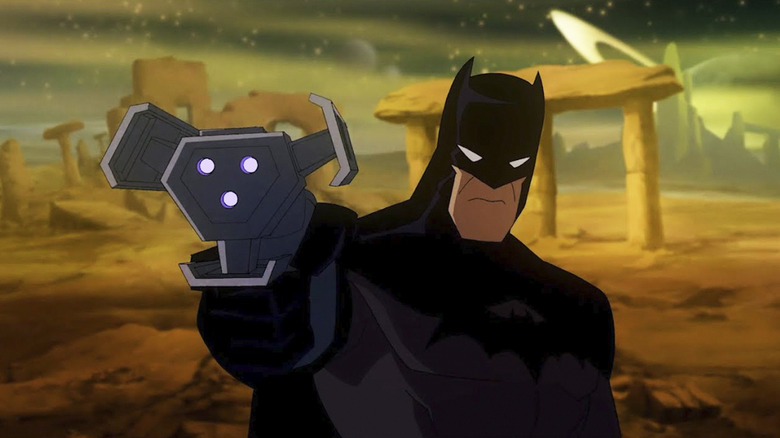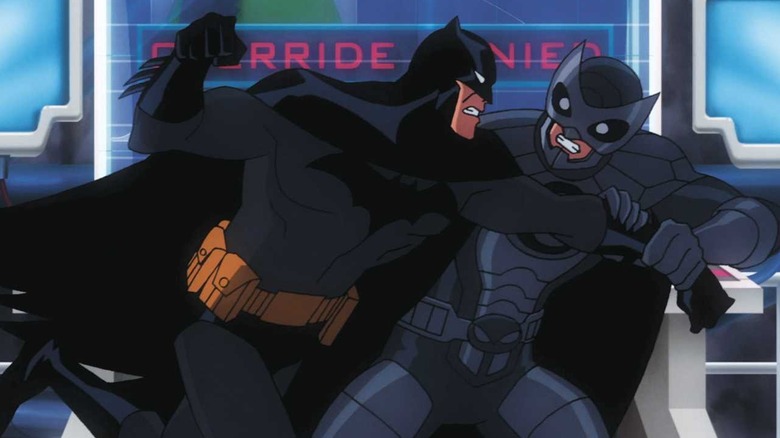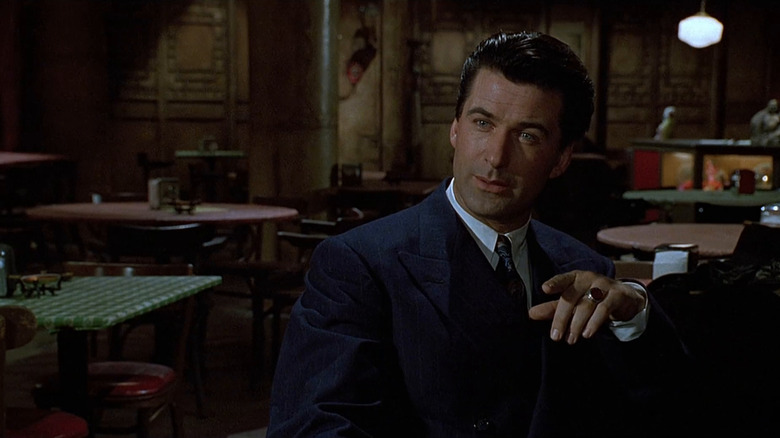A Batman Voice Actor Almost Starred In The Worst Live-Action Caped Crusader Movie
The late Val Kilmer starred in "Batman Forever," and that was the only time he appeared as the Caped Crusader. Many will defend Kilmer as an undersung Batman, but some reported communication issues and the rush to make the sequel "Batman & Robin" saw Kilmer replaced by George Clooney.
"Batman & Robin" is notoriously bad. Its "worst movie ever" reputation has been firmed up by internet hyperbole, to be sure, but it is a bad film. Marvel Studios President Kevin Feige considers "Batman & Robin" one of the most important superhero movies because, in his words, "It was so bad that it demanded a new way of [making superhero films]."
Clooney is my least favorite live-action Batman, and I'm not alone in saying that. He's a great actor in general, but he was wrong for that part. (He's more of a Superman.) In the hustle to replace Kilmer as Batman, Clooney wasn't the only actor who Schumacher considered. One of the others was William Baldwin, who had appeared in Schumacher's 1990 horror film "Flatliners." Then, Schumacher decided on Clooney after seeing him in "From Dusk Till Dawn." Clooney had the humor, humanity, and look for the part, Schumacher told Film Scouts, and he looked more like a grown man compared to Chris O'Donnell's Robin. Kilmer's Batman and O'Donnell's Robin, on the other hand, could have passed as brothers.
Baldwin would ultimately play Batman much later in the 2010 animated film called "Justice League: Crisis on Two Earths." Interviewed about that by now-defunct IESB.net (preserved by ComicBookMovie.com), Baldwin recalled how Schumacher almost cast him in "Batman & Robin."
Apparently, Baldwin was one of Schumacher's top four choices for Batman even back during "Batman Forever," along with Kiilmer, Ralph Fiennes, and Daniel Day-Lewis. When Kilmer didn't come back for "Batman & Robin," Baldwin said that Schumacher again approached him:
"The next time, when George Clooney did it, (Schumacher) said, 'You were on my original short list with those other three actors, but the studio went with Val and this time I'd like to go with you.' And that Friday afternoon, I thought I was playing Batman — and then Monday morning, the headlines in the trades said that George Clooney had gotten the part. So apparently, I did actually come very close."
Would Baldwin have been better than Clooney? What does his eventual voiceover performance as Batman suggest?
William Baldwin played Batman in Justice League: Crisis on Two Earths
"Justice League: Crisis on Two Earths" takes place in a "mirror universe" where alternate versions of the Justice League — the Crime Syndicate — inflict a reign of unstoppable terror and larceny on the world. An alternate Lex Luthor (Chris Noth), his world's only remaining superhero, travels to the Justice League's Earth and asks for their help. I consider "Crisis on Two Earths" to be the best multiverse superhero movie thanks to interplay between Batman and his counterpart, Owlman (James Woods).
This Batman is way different from Clooney's smiley one. "Crisis on Two Earths" was originally written to be part of the DC Animated Universe, set between "Justice League" and "Justice League Unlimited." Dwayne McDuffie's original DCAU-canon script has since been made publicly available — it only has surface-level differences to the final film, and much of the dialogue is the same.
William Baldwin is essentially playing the same iteration of Batman that was voiced by Kevin Conroy, and by this point, the character was a stern loner. McDuffie almost certainly wrote Batman's (and maybe even Owlman's) dialogue in "Crisis on Two Earths" for Conroy's voice. So while Baldwin does an OK job, he stands in the shadow of the best Batman ever. Batman sits out most of the second act, but comes back into focus when Owlman reveals a plan to destroy reality, convinced the multiverse renders all other choices meaningless. He's invented a bomb called the Quantum Eigenstate Device, or Q.E.D. — "quod erat demonstrandum." That's a Latin saying often used to put a pin at the end of an argument. Owlman's Q.E.D. is the end of existence and his argument, the ultimate demonstration on life's meaninglessness.
In fighting Owlman, Batman gets a taste of what it's like to fight himself, but a version of himself without any moral scruples. Owlman overpowers Batman and sees right through him with the skill of a great detective:
"From what I gather, we're very much alike. Everything about you tells the tale. Your attitude, your costume, your tactics. They all scream of outrage. Despair. Vengeance. What terrible wrong was done to set you on this path?"
But in the end, Batman wins, sending Owlman and his bomb to a lifeless world. He repays the favor by offering his own analysis of Owlman: "We both looked into the abyss, but when it looked back at us, you blinked."
Compare this to the "Justice League" episode "A Better World," where the League meets a version of themselves (the Justice Lords) who seized control of the world for the "greater good." The two Batmen (both Conroy) wind up sparring and debating. In the end, the Lord Batman wins the argument with his response to League Batman's claim that "You grabbed power!":
"And with that power, we've made a world where no eight-year-old boy will ever lose his parents because of some punk with a gun!"
The line gets extra power because Conroy is the one saying it, the same way I'm sure Batman's line about looking into the abyss would have if the movie had been made as intended.
You know who would've been a great Batman? Alec Baldwin
Knowing that, in the mid-'90s, Joel Schumacher was considering William Baldwin to play Batman makes me think he was almost onto something. Almost, because what could have been even better than William Baldwin as Batman is his older brother Alec as Batman.
Alec Baldwin is obviously very, very good at comedy. Playing Jack Donaghy on "30 Rock" from 2007 to 2013, he often showed the same strength that Adam West did as Batman: Sounding serious while saying something ridiculous. But I can just as easily see him doing a more broody Batman.
Tim Burton, who worked with Baldwin on "Beetlejuice," went with Michael Keaton instead for "Batman" (1989). Baldwin recently discussed why Burton didn't call him up to be Batman on the "One Bad Movie" podcast (hosted by his and William's brother, Stephen):
"[Tim Burton] said to my ex-wife, Kim [Basinger, who played Vicki Vale in 'Batman'] 'I wasn't casting Batman — the guy, the square jaw, the suit, whatever, I was casting Bruce Wayne, and I wanted to get a guy who seemed like you could understand him being more troubled.' He goes, something like, 'You know, I don't believe that Alec has any problems at all in his life.'"
I can kind of see where Burton's coming from with that comment — Baldwin is very classically handsome and projects a stern calm — but I don't totally agree. I'd actually argue Alec Baldwin is similar to Michael Keaton as an actor: a funny guy with a dark side he can channel for drama. So, Baldwin could be the same kind of Bruce Wayne that Keaton was, charming enough but a bit offbeat and reclusive, and with rage simmering under the surface. In 1994, Alec Baldwin even played the lead role in "The Shadow," about the eponymous pulp hero. Batman himself was based on the Shadow; if Alec Baldwin could be Lamont Cranston, he could be Bruce Wayne.
In 2025, Alec's chance to wear Batman's cowl has probably passed (unless he does voiceover like William did). Alec Baldwin sits next to Gregory Peck (the artistic model for Bruce Wayne in "Batman: Year One") as the best Batman who never was.


